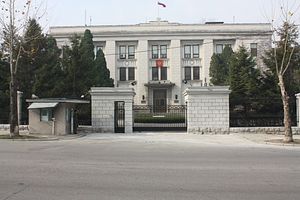On Monday, North Korea and Russia signed an economic cooperation agreement following Russian Deputy Prime Minister Yuri Trutnev’s three-day visit to Pyongyang. Trutnev met with Ro Tu-chol, vice-premier of the DPRK cabinet, and the two discussed broader economic and political cooperation. The visit was part of Russia’s bid to improve bilateral relations with the DPRK. According to ITAR-TASS News, the Russian delegation also included “Primorstky Territory Governor Vladimir Miklushevsky, Khabarovsk Territory Governor Vyacheslav Shport, and Amur Region Governor Oleg Kozhemyako.”
In addition to signing the economic cooperation agreement, the Russian delegation attended two ceremonial events in Pyongyang. The delegation reportedly visited the Liberation Monument in Pyongyang, which contains a plaque that heralds the Soviet Union’s role in the Korean War. “Eternal glory to the Great Soviet Army that liberated the Korean People from the yoke of Japanese militarists and opened up the road for the Korean people to freedom and independence!”
According to KCNA, North Korea’s state news agency, “At the talks both sides exchanged views on the issue of boosting the economic and cooperative relations between the two countries and other issues of mutual concern.” An important part of the visit likely concerned the 54-kilometer double-track rail link between the town of Khasan in southeastern Russia and Rason in North Korea’s northeastern tip.
The rail-link between North Korea and Russia has important strategic and economic implications for Russia. President Vladimir Putin sees the rail-link as an important missing piece in his bid to turn the Trans-Siberian Railroad into a viable land-based alternative transportation route for East Asian goods to Europe, bypassing the Suez Canal entirely. The rail-link would connect the Korean peninsula to European train networks over 8,000 kilometers away.
According to Bloomberg, the land-based route is “as much as three times faster than shipping via Egypt’s Suez Canal which handles 17,000 ships an year, accounts for about 8 percent of maritime trade — and is increasingly beset by pirates and political instability in Egypt and Syria.” In particular, the security concerns arising from the Suez route give Russia an opportunity to prove that its land-based train routes are safer and more reliable. A major challenge for Russia, should this rail-link prove viable in linking East Asia to Europe, will be to convince global companies to risk their cargo via a North Korean-based route. In addition, shipping goods by rail tends to be much costlier than maritime shipping.
The project also represents a major economic opportunity for North Korea, which continues to face international isolation over its nuclear program and general non-compliance with international norms. While China is North Korea’s closest partner, Russia has grown increasingly interested in the country for its economic value. Apart from the rail-link project, little is known about whether Moscow is attempting to condition Pyongyang to behave less provocatively with regard to South Korea and its nuclear program. Russia is part of the Six Party Talks on North Korea’s nuclear program that were suspended in 2010 and have yet to resume.
































